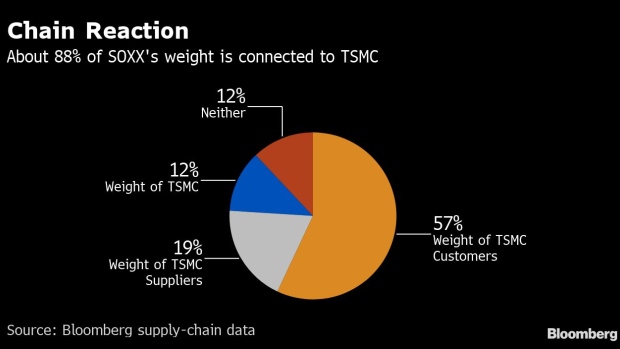Jul 17, 2019
One chipmaker may tell ETF traders everything about earnings
, Bloomberg News

Exchange-traded fund investors have a lot riding on earnings from Taiwan Semiconductor Manufacturing Co. this Thursday.
Almost 90 per cent of the iShares PHLX Semiconductor ETF and the VanEck Vectors Semiconductor ETF -- the two largest semiconductor ETFs -- is in some way connected to the company, known as TSMC, according to Bloomberg supply-chain data. Semiconductor equipment suppliers like ASML Holding NV, Applied Materials Inc., and KLA Corp. all derived more than 10 per cent of their revenue from TSMC in the previous quarter, the data show.
For example, about 15 per cent of Applied Materials’ fiscal second-quarter revenue came from its relationship with TSMC. Applied Materials has about a 4 per cent weight in both the SOXX and SMH funds.
Most major semiconductor companies don’t make the chips themselves. Instead, they will design them and outsource production to another company, like TSMC. TSMC is the world’s largest contract manufacturer of chips.
TSMC “is unequivocally critical to the industry” and its earnings forecast will be closely watched by investors, said Bloomberg Intelligence analyst Anand Srinivasan. “Guidance is critical and color for the second half -- especially for smartphone chips -- may set the tone for how chip vendors are planning supply in anticipation of demand.”
Performance of semiconductor stocks has been highly volatile so far in 2019, with swings of more than 10 per cent up or down in four of the past six months, much more volatile than the S&P 500, according to Bloomberg Intelligence. After a wave of optimism that drove stocks to record highs this spring, investors have been growing increasingly skeptical that demand, pricing and inventory levels will improve in the second half of this year.


